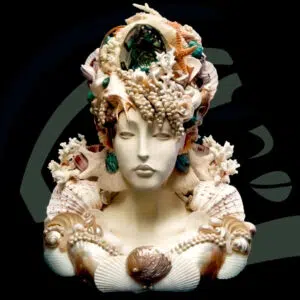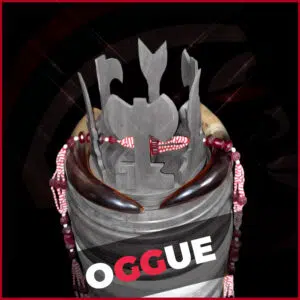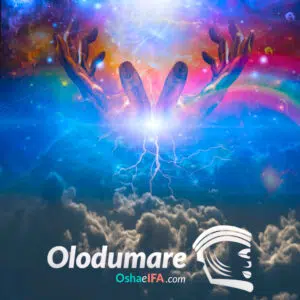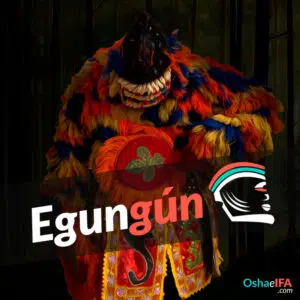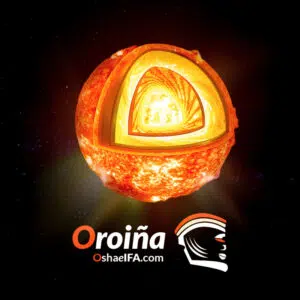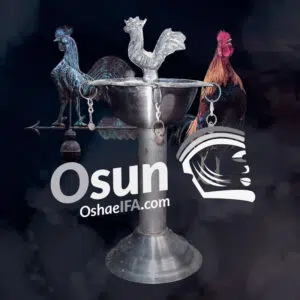Odi She (7-5): Meaning, Analysis and sayings of this Ifa Sign
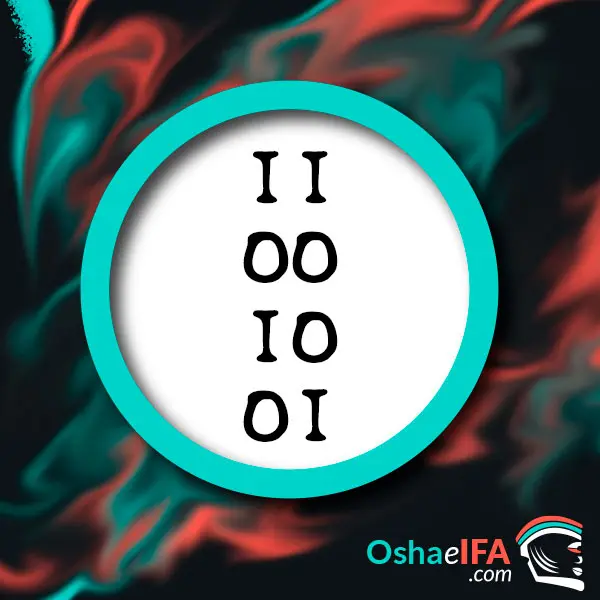
Odi She reveals that the origin of the negative lies within us: in the body, in the home, and in the mind, often by not considering the consequences of our actions. This is Odu number 75 in the Ifá hierarchy, he urges offering sacrifices to Orunmila, Oshun and Yemaya. By doing so, we move towards a favorable position in life.
Description of the Odu Odi Oshe (7-5)
What is born in the Odu Odi She?
- Born: That the person does not agree with his Guardian Angel.
- The Apetebi Ceremony.
- Thrombocythemia.
- The Guardian Angel is asked for forgiveness.
- In this Odu, the first husband the chicken had was the pheasant. Then she married the rooster.
What is Odi She talking about?
- It is recommended to have only one woman.
- Here the moral of man is doubted.
- You have to feed the four cardinal points.
- A stuffed Orunmila goat leg is placed in each Ifá hand.
The Odi She sign points out:
- Shango transformed into Diablo.
- It was where Orunmila made the luck.
- He is acquitted for lack of evidence.
- This Oddun is destructive, since it destroys the person and, in order to win, he has to be an Oba.
- Here, if you live in the last room of the house, pour water before you go out in the morning, because there is a dead person who harms you.
Analysis and Interpretation of the Odi She Sign:
Odi She tells us about a life cycle where confrontation with our own being and external forces is inevitable.. It is a call to recognize that, in dissonance with the Guardian Angel or in disagreement with our protective divinities, lies the seed of growth and transformation. Promiscuity and infidelity, metaphorically, represent not only betrayal in personal relationships but also deviation from our true spiritual path.
Economic Aspects:
This Odu warns of delay and financial difficulties that can arise not only from dishonest actions, as hidden thefts, but also for not living in accordance with our deepest truths. Prosperity will come by feeding the four cardinal points of Ifá, symbolizing the need to balance all facets of our life and honor the roots of our existence.
Health:
Odi She points out the vulnerability to diseases caused by internal and external imbalances, including those that evolve rapidly and are sexually transmitted.. References to stomach and kidney disease, and conditions that prevent procreation, remind us of the importance of taking care of our body as a temple of the spirit. The Apetebi ceremony and the proposed sacrifices are metaphorical calls to purify and reconcile our inner being with the universe.
Religious Aspects:
Reconciliation with the Guardian Angel and the act of asking for forgiveness symbolize the need for spiritual alignment and recognition of our faults to move forward.. Ebo, sacrifices and feeding the land are essential practices to restore balance and ensure divine protection. Odi She teaches us that, through humility and acceptance, we can transform our adversities into blessings.
Personal Relationships (Love):
This Odu warns about the dangers of infidelity and the consequences of living in disagreement with moral and spiritual principles. The recommendation to have only one partner and live in accordance with our spiritual beliefs highlights the importance of fidelity, integrity and commitment. Our relationship with loved ones should be a reflection of our commitment to truth and honesty.
You may also be interested in: Odu of Ifa Oshe Di
Sayings of the Odu Odi She:
- Acquitted for lack of evidence.
- If a loved one throws me away, I look for another.
- The river drags the adult person, when he does not know his weight.
- Too much promiscuity brings disease insurance.
- One little thing can wreak untold havoc.
- He who makes sacrifice lengthens his life.
- The bad is inside the body and inside the house.
«The river drags the adult person, when they do not know their weight» teaches us about the importance of self-awareness and knowing our own limitations. It symbolizes how, regardless of age or experience, a lack of understanding about our capabilities can lead us to situations of danger or failure. Recognizing our limitations is as crucial as knowing our strengths.
Ifa Ethical Code of the Odu Odi She:
- The Awó lives with religious women.
Discover: What are the Children of Yemaya like?
Meaning of Odu Odi Oshe (7-5)
The Odu Odi She warns about infidelity in women and highlights the importance of performing EBO to avoid premature death, as well as the need to feed the earth (Inle Oguere), in a gesture of respect and recognition to the forces of nature.
This Odu tells the story of a hen who waited for her eggs to hatch in three Fridays, without understanding that achieving any goal in life requires persistent time and effort.
It reveals a conflict with the Guardian Angel, expressing the desire to be protected by another Saint, which symbolizes the beginning of various delays in life. Therefore, it is essential to ask for forgiveness and reconcile with spiritual forces.
When Odi She appears in the form of Intori Ofo, it is essential to carry out EBO within the following three days. In case OSOBO arises, it is a sign that a spirit demands mass rituals.
This Odu, known as the Ifá of the cochineals, warns about hidden thefts that, once revealed, will cause great losses. The importance of staying away from situations that could involve accusations of theft is emphasized, as this could result in incarceration. However, Odi She also mentions that absolution can be obtained in the absence of concrete evidence.
Furthermore, this Odu indicates that people can suffer mental disorders or go crazy, due to internal moral conflicts or curses directed towards them.
This Ifa reveals ORUNMILA's success using weapons, suggesting overcoming obstacles through cunning and wisdom.
People under the influence of this Odu may experience a fragile physical constitution.
Finally, Odi She represents the four AONIKO (Little Tempting Devils), symbolizing the tests and temptations that must be overcome to advance spiritually.
Recommendations of the Odi She sign:
- Perform Ebo and proper sacrifices: Essential to maintain spiritual balance, attract divine protection and ensure general well-being.
- Feed the earth and the Saints: Crucial act to honor the divinities and nature, promoting harmony and prosperity.
- Ask for forgiveness from the Guardian Angel: Fundamental to align our spirit with divine forces.
- Maintain a single partner and be faithful: Monogamy and loyalty are keys to the integrity of loving relationships.
- Practice the same religion with your partner: Sharing spiritual beliefs strengthens ties and promotes growth and common understanding.
- Follow health recommendations: Pay attention to disease warnings and take preventive measures.
- Move house three times if necessary: Symbolizes the search for a favorable environment for well-being and spiritual protection.
- Respect and honor elders and ancestors: The wisdom and blessings of elders guide our path in life.
- Feed the four Cardinal Odus of Ifá (EJIOGBE, BABA OYEKU MEJI, BABA IWORI MEJI and BABA ODI MEJI): To control approaching Eguns, reinforcing spiritual protection and balance.
Odi Oshe Bans (7-5):
- Avoid promiscuity and infidelity: These actions not only damage personal relationships, but can also divert people from their true spiritual path.
- Do not despise your previous partner: Contempt and lack of respect towards those who have been part of our path only bring negative karma and obstacles in the future.
- Do not consume certain animals: Specifically, eating hutía and other animals that create tunnels is prohibited, as a metaphor for avoiding behaviors that take us down dark or confusing paths.
- Avoid contempt between siblings: Contempt, especially towards the darker or different member of the family, is an action that should be avoided, as it fosters division and resentment.
- Do not live in damp or high houses: These environments can be detrimental to a person's physical and spiritual health.
You can read: Meaning of the Odu of Ifa Odi Meji
Ifa says in the odu Odi She:
When this Odu comes out in the Igbodun the person will be told that it is the foundation on which the building of his family rests, he will also be told to prepare his altar to Eshu-Elegba without delay, in divination the person will be told I would say of serving Eshu-Elegba a goat to avoid being given a task that goes beyond his possibilities.
If this Odu goes out in the Igbodun, the person will be told that his wife has been misbehaving and that he must make the necessary appeasement immediately. In divination the person should sacrifice a goat to Eshu-Elegba due to an impending problem for a woman.
When Odi she comes out in divination, the person will be told to fulfill his head, because his problems will very soon be a matter of the past and after this he will enjoy a life of joy and rejoicing.
Odi She in Ire
In the context of AWOFAKAN or IKOFAFUN, this Odu reveals the need to begin the spiritual path through kari osha, as a means to extend the life of the individual.
It highlights the problem of discrimination within the family, where the brother with darker skin tone is rejected and disliked, suggesting that the best option for him is to distance himself and live apart, thus avoiding being destroyed by brotherly hatred.
This Odu also reflects a total absence of peace in personal relationships, warning against holding resentment towards others.
Odi Oshe (7-5) at Osobo
It warns about possible imbalances in the nervous system and emotional complexities that can seriously affect mental health.
The importance of adequate nutrition is emphasized to prevent diseases such as anemia or lung problems.
Through the parable of the chicken, vulnerability to diseases and adversities is illustrated, where, symbolically, mealybugs represent parasites or problems that consume the vitality of the individual without being detected in time.
Odi Oshe addresses the topic of sexually transmitted diseases, which can be a consequence of promiscuity, highlighting the importance of responsibility and personal care.
The narrative about the hen that gave birth to seven chickens, including a black one despised by its siblings, serves as a metaphor for discrimination and exclusion, underscoring the need for understanding and acceptance within the family.
Prayer of the Sign of Ifa Odi Oshe:
ODI SHE ADIFAFUN OLUO BASS DRUM SHEKETE SHEKETE OFO LERI MODUN ERINI
ODIKERESHE IGI OBASHE KIN ONI ADIFAFUN OLOSHE OLOFIN ADIFAFUN AMAFOFO
OLO FARIÑO OGUN EYELE LEBO EURE LEBO.
Suyere of the Oddun of Ifa Odi Oshe:
ODISHE AUN BABALAWO BASS DRUM SHEKETE SHEKETE BASS DRUM.
Ebó of the Sign Odi She 7-5
Sarayeye:
To perform the Sarayeye, a chameleon (Agüema) is used. This is placed inside a small box and, as it changes color, it is cleaned. The chameleon is then released back into its natural environment.
Offering (Ebó):
- Animals for sacrifice: 1 rooster, 1 pullet (young chicken), 2 pigeons.
- Other elements of the Ebó: Worms, mealybugs, 10 chicken eggs, jutía and smoked fish, corojo butter.
- Additional Instructions: A significant amount of money is required to complete the Ebó. It is important to note that the chick is not sacrificed. Instead, insects (worms and mealybugs) are offered as food in the ritual.
This Ebó ceremony, detailed for the Odi She 7-5 sign, focuses on purification and offering to attract protection and prosperity, using symbolic elements to restore balance and harmony in the practitioner's life.
You may also be interested in: Ifa Odi Roso sign
Patakie of the sign Odi She:
The chicken's eggs
The hen laid eggs every day and waited for her chicks to hatch after three Fridays (21 days). However, their enemies—mealybugs, worms, ants and other insects—pecked their eggs until they were completely empty.
Tired of this situation, the chicken decided to visit Orúnmila, who, after giving her a reading (Osode) and seeing the Odu Odi She, recommended that she make an Ebó. The ritual would include 5 eggs, worms, ants, a rooster, two chickens and other necessary ingredients.
The hen complied with the Ebó and, as a result, acquired the ability to see the insects when they approached her eggs. Armed with this new ability, she began killing them. Since then, every time the hen sits on her eggs, she remains vigilant and ready to attack any intruder.
Explanation: This Pataki by Odi Oshe illustrates the importance of seeking solutions to problems and not giving up in the face of adversity. The chicken, facing repeated failures due to external factors, decides to seek help and, through the wisdom and ritual suggested by Orúnmila, manages to overcome her challenges.
The Disorder of Minds: The Restoration of Elelu Iya Ilori
Oluo Bomo Shekete Awo was a Babalawo assigned to lead the Elelu Iya Ilori Land after the death of Amafofo, the Obá of those lands. Gifted with the Odu Odi Oshe, he had knowledge of Osanyin sorcery, which allowed him to take over people's brains for his own benefit. He began to collect the brains of the inhabitants, storing them at the foot of a peaceful sea bush (Atorí), without making distinctions between them.
The arrival of Onye Awó, a messenger from Olofin, changed the course of events. Upon seeing the state of the population, he performed an Osode with the Odu Odi-Oshe, made Ebó offering a goat to his Ifá and reported the situation to Olofin. The latter sent Obatalá to investigate Oluo Bomo's actions.
Anticipating Obatalá's arrival, Oluo Bomo attempted to rectify his mistake with the help of Eshu-Elegba, returning the brains to their original owners. However, by having them all mixed together, the brains were wrongly assigned: children with the brains of old people, women with those of men, and vice versa. When Obatalá arrived, he had to personally intervene to restore the natural order.
As a consequence, Obatalá, following Olofin's orders, removed Oluo Bomo from leadership over Elelu Iya Ilori, due to his mismanagement and manipulation of the brains of the people under Odu Odi Oshe.
Explanation: This story highlights the importance of responsibility and respect for spiritual power and knowledge. Abusing such power for personal gain, especially when it involves manipulating the essence or will of others, carries serious consequences. The intervention of figures of spiritual authority, such as Obatalá, symbolizes rectification and the reestablishment of order and natural harmony. Ultimately, the narrative warns of the repercussions of overstepping ethical and moral boundaries, remembering that balance and mutual respect are essential in any community.
Odi Oshe Ifa Traditional
The divination that he made in heaven
Awo lafi showo, awo lafi shese
Ikpon meji olowo, oron mo soro
These were the Awoses who guessed for Edise when she came to the world, she was told to make sacrifices to avoid insurmountable trouble on earth she was told to sacrifice a goat to Eshu but she did not want to do so.
Upon reaching the world he was initiated into the cults of various deities, he wore beads on his legs, meanwhile Orishanlá invited the 200 deities with the aim of building a house for him during the season to raise the walls of the house, he told him to use your feet to even out the wall and reddish mud without adding water to it. After 199 divinities had been gathered, they reported that Orúnmila was absent meanwhile Orúnmila left his house to enter the forest with his beaded leg in search of herbs for his work, but was stopped by Eshu-Elegba in the forest for the goat that he had refused to give her.
Somehow he managed to find a goat for Eshu-Elegba since while he was arguing with Eshu-Elegba the other divinities refused to start the work due to the absence of Orúnmila finally they all dispersed without doing any work Eshu-Elegba however advised to Orúnmila to go to the construction site and did so, assuring him of his livelihood.
When he got there Orishanlá told him to crush the mud by himself without help since it had been his absence from work that had dispersed the others without being able to fulfill the task meanwhile Eshu-Elegba had disconnected the rain tap in the sky and therefore the rain began to fall. So he managed to soften all the mud. Between him and Eshu-Elegba they prepared the mud and were ready to lift the walls.
After that Orishanlá told Orúnmila that the foundation of the house had to be completely cast. He was confused because he was not able to imagine how a base like that could be raised although Eshu-Elegba told Orúnmila to invite Orishanlá to place the first mud as a symbol of the tradition that remained there that is the owner of the house who places the first mud or block as a gesture of invitation to the other builders from there.
Therefore orunmila He invited Orishanlá to place the first mud. When Orishanlá threw all the mud, it did not fit on the wall. He was throwing mud three times and it fell to the floor.
Finally Orishanlá put the first mud on the ground and they prepared the foundation around the house and Orúnmila stated that he had already completed his session, the other divinities later came to complete the construction of the building.
I HATE I KNOW - ESÉ FROM IFA
Ìdin I know or
Ìrèlè I know or
Igi ogbà I know
Kéni or lòmíìn
oko ku
ki n loko
Àle ku
Kí n yàn òmíìn
Béní orí ení ò bá kú
Ení ilèélè ò le deni orí ení
A dífá fun Àjàgùnmòlè
Èyí tíí soloríi gbogbo Awo lálàde òrun
Wón ní ó rbo
Wón ní tí bá tí ń bo òkè ìpòrí è
Wón ní ò si nňkankan tú kù mó
Or I know
hey hey
Èmí è gùn
N ní wá ń jó ní ń yò
N yin àwon Babaláwo
Àwon Babaláwo ń yin Ifá
Ó ní béè làwon Babaláwo tòún wí
Ìdin I know or
Ìrèlè I know or
Igi ogbà I know
Kéni or lòmíìn
oko ku
ki n loko
Àle ku
Kí n yàn òmíìn
Béní orí ení ò bá kú
Ení ilèélè ò le deni orí ení
A dífá fun Àjàgùnmòlè
Èyí tíí soloríi gbogbo Awo lálàde òrun
Bí n ba rówó ní
ó dorún re
Ìwo Àjàgùnmòlè
ó dorún re
Bí ň bá raya ní
ó dorún re
Ìwo Àjàgùnmòlè
ó dorún re
Bí ň bá romo bí
ó dorún re
Ìwo Àjàgùnmòlè
ó dorún re
Bí ň bá rílé kó
ó dorún re
Ìwo Àjàgùnmòlè
ó dorún re
Bí mo bá e ku
ó dorún re
Ìwo Àjàgùnmòlè
Ó dorún re.
Ifá in Odi She wants this person to be well. He must offer sacrifice, and his life will please him. He will have long life, and peace of mind. He is exhorted to worship Ifa.
Ìdin I know or
Ìrèlè I know or
Let the tree defense break
To replant another
Let my husband die
To marry another
Let my concubine die
Paving the way for me to find another
If the person who lies on the mat does not die
He who lies on the bare ground, will not be able to lie on the mat
They prophesied Ifá for Àjàgùnmòlè
The leader of the Babaláwos in Heaven
Who was advised to offer sacrifice
And they told him that if he made many sacrifices to Ifá
He wouldn't worry about a thing
He sacrificed
And his life was peaceful
Getting long life
He rejoiced and praised his Babaláwos
They praised Ifá
He said it was exactly as his Babaláwos had said
Ìdin I know or
Ìrèlè I know or
Let the tree defense break
To replant another
Let my husband die
To marry another
Let my concubine die
Paving the way for me to find another
If the person who lies on the mat does not die
He who lies on the bare ground, will not be able to lie on the mat
They prophesied Ifá for Àjàgùnmòlè
The leader of the Babaláwos in Heaven
If I don't have money to spend
I will hold you responsible for it
To you Àjàgùnmòlè!
If I can't get a woman to marry
I will hold you responsible for it,
To you Àjàgùnmòlè!
If I am sterile.
I will hold you responsible for it,
To you Àjàgùnmòlè!
If I can't build a house.
I will hold you responsible for it,
To you Àjàgùnmòlè!
If I die young.
I will hold you responsible for it,
To you Àjàgùnmòlè!
You are responsible for my destiny!

